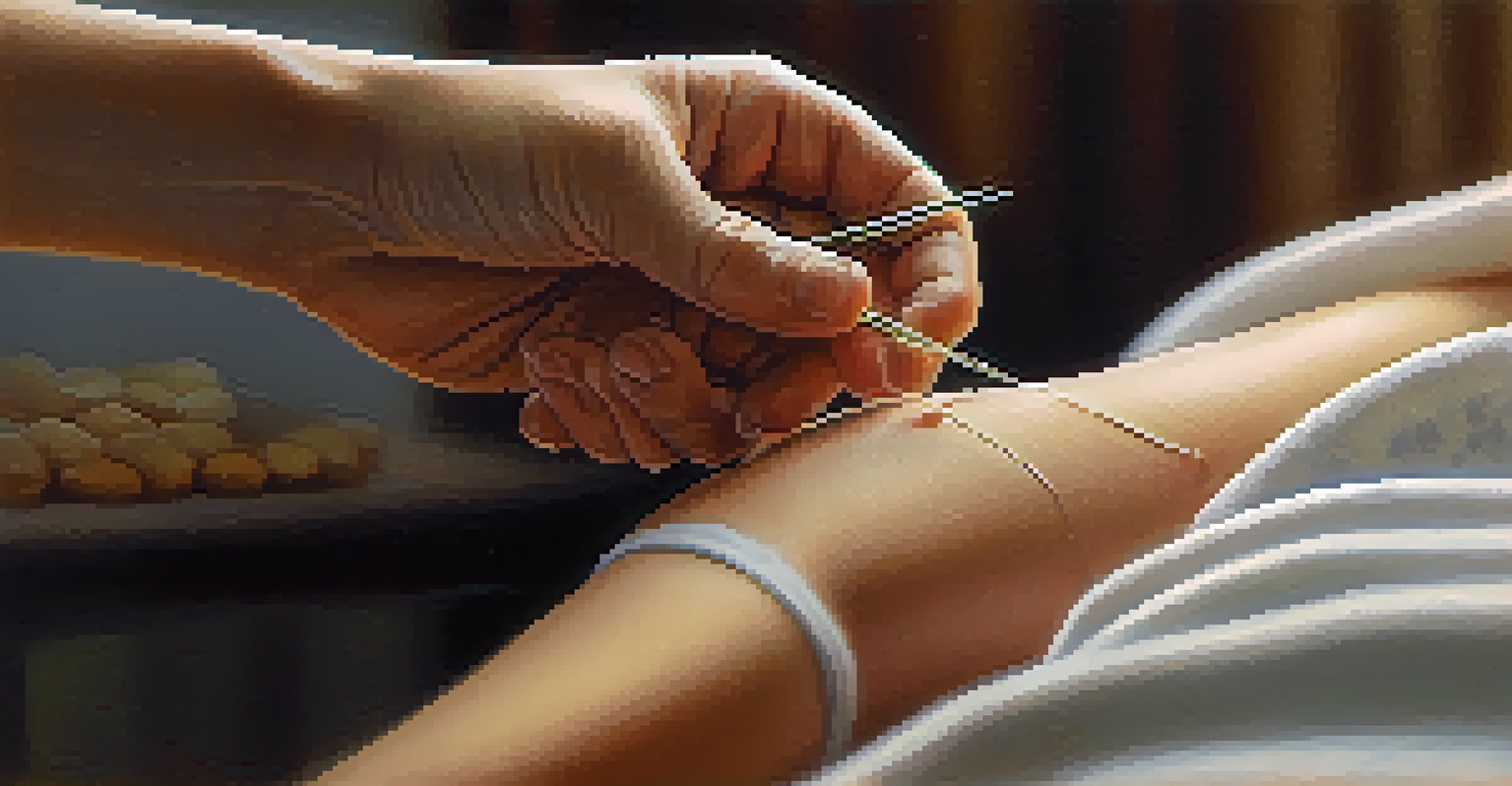Integrating Acupuncture in Post-Surgical Recovery Plans

Understanding Acupuncture and Its Benefits
Acupuncture is a holistic practice rooted in Traditional Chinese Medicine that involves inserting thin needles into specific points on the body. This technique is believed to stimulate the nervous system, promoting healing and pain relief. Many patients report reduced discomfort and improved emotional well-being after acupuncture sessions, making it a great complement to post-surgical recovery.
Acupuncture is a technique that can help individuals achieve a state of balance, leading to both physical and emotional healing.
By enhancing circulation and reducing inflammation, acupuncture can help speed up the healing process. Clinical studies suggest that it can also alleviate anxiety and stress, which are common after surgery. This sense of calm can be particularly beneficial for patients as they navigate the challenges of recovery.
Incorporating acupuncture into a post-surgical recovery plan can lead to a more holistic approach to healing. As patients experience less pain and anxiety, their overall morale and ability to engage in physical therapy may improve, further supporting recovery efforts.
The Role of Acupuncture in Pain Management
Pain management is a crucial aspect of post-surgical recovery, and acupuncture has been shown to be an effective tool in this regard. Research indicates that acupuncture can help reduce the need for pain medication, which is a significant benefit for many patients. By targeting specific points, acupuncture assists in the release of endorphins, the body's natural painkillers.

Many patients who have undergone surgery report a decrease in pain intensity following acupuncture treatments. This can lead to a more comfortable recovery experience, allowing individuals to focus on their rehabilitation rather than being preoccupied with discomfort. Additionally, fewer prescriptions for pain medication can help avoid potential side effects associated with pharmaceuticals.
Acupuncture Aids Post-Surgery Healing
Incorporating acupuncture into post-surgical recovery can enhance healing by reducing pain, anxiety, and inflammation.
Integrating acupuncture into a pain management strategy not only fosters physical recovery but also enhances mental well-being. Feeling less pain can lead to improved mobility and a more positive mindset, making it easier for patients to adhere to their recovery plans.
Promoting Emotional Well-Being After Surgery
Emotional health is often overlooked in post-surgical recovery, yet it plays a vital role in the healing process. The stress and anxiety that can accompany surgery may hinder recovery, making it essential to address these feelings. Acupuncture is known for its calming effects, which can help promote emotional balance.
The greatest wealth is health, and acupuncture can be a vital part of maintaining and restoring it.
Studies show that acupuncture can reduce symptoms of anxiety and depression, offering patients a sense of relief during a challenging time. By creating a space for relaxation, acupuncture sessions can also serve as a form of self-care, helping individuals reconnect with their bodies and emotions post-surgery.
Incorporating acupuncture into recovery plans allows patients to address both their physical and emotional needs. This dual approach can significantly enhance overall well-being, leading to a more efficient and positive recovery experience.
Acupuncture and Enhanced Physical Recovery
Physical recovery after surgery often involves rehabilitation exercises and therapies. Acupuncture can complement these efforts by improving blood flow and promoting tissue healing. This enhanced circulation can help deliver essential nutrients and oxygen to the injured areas, speeding up recovery.
Many patients find that acupuncture helps them regain mobility more quickly and effectively. As tension and pain decrease, individuals are more likely to engage in physical therapy, which is crucial for restoring function. This synergy between acupuncture and traditional rehabilitation methods can lead to better outcomes overall.
Emotional Balance is Key to Recovery
Acupuncture promotes emotional well-being, which is essential for a more efficient and positive recovery experience.
By integrating acupuncture into a physical recovery plan, patients may experience a smoother transition back to their daily activities. The combination of pain relief and increased mobility can significantly boost confidence and motivation during the recovery journey.
Timing and Frequency of Acupuncture Treatments
When it comes to acupuncture, timing and frequency are essential for maximizing benefits. Ideally, patients should begin acupuncture sessions shortly after their surgical procedure, as this is when pain and recovery challenges are most pronounced. Regular sessions can help maintain progress and prevent setbacks.
The frequency of treatments may vary based on individual needs and the nature of the surgery. Many practitioners recommend starting with sessions once or twice a week, gradually adjusting as the patient improves. This flexible approach allows for a tailored recovery plan that addresses each person's unique situation.
Incorporating acupuncture into a post-surgical recovery timeline can yield significant benefits. Patients should consult with their healthcare team to determine the best schedule that aligns with their recovery goals and overall health.
Finding Qualified Acupuncture Practitioners
Choosing the right acupuncturist is crucial for achieving the desired results in post-surgical recovery. Patients should look for practitioners who are licensed and have experience treating individuals recovering from surgery. Recommendations from healthcare providers or trusted friends can be valuable in this search.
A qualified acupuncturist will conduct a thorough assessment before beginning treatment. This process includes discussing the patient's medical history, surgical details, and specific recovery goals. This personalized approach ensures that the acupuncture sessions are tailored to meet the patient's unique needs.
Choose Qualified Practitioners
Finding a licensed and experienced acupuncturist is crucial for maximizing the benefits of acupuncture in recovery.
Taking the time to find a skilled acupuncturist can make a significant difference in the recovery experience. By establishing a trusting relationship, patients can feel more comfortable and open during treatments, enhancing the overall effectiveness of acupuncture.
Integrating Acupuncture with Traditional Recovery Methods
Acupuncture should be viewed as a complementary therapy rather than a replacement for traditional post-surgical care. It works best when integrated with conventional approaches such as physical therapy, medication management, and follow-up appointments with healthcare providers. This holistic view of recovery can lead to more comprehensive healing.
Patients are encouraged to maintain open communication with their healthcare team about their desire to include acupuncture in their recovery plans. This dialogue ensures that all aspects of care are aligned and that practitioners can monitor progress effectively. By working together, patients can optimize their recovery experience.

The combination of acupuncture and traditional methods can help create a personalized recovery roadmap. This multifaceted approach can lead to a faster and more thorough healing process, ultimately improving the patient's quality of life post-surgery.